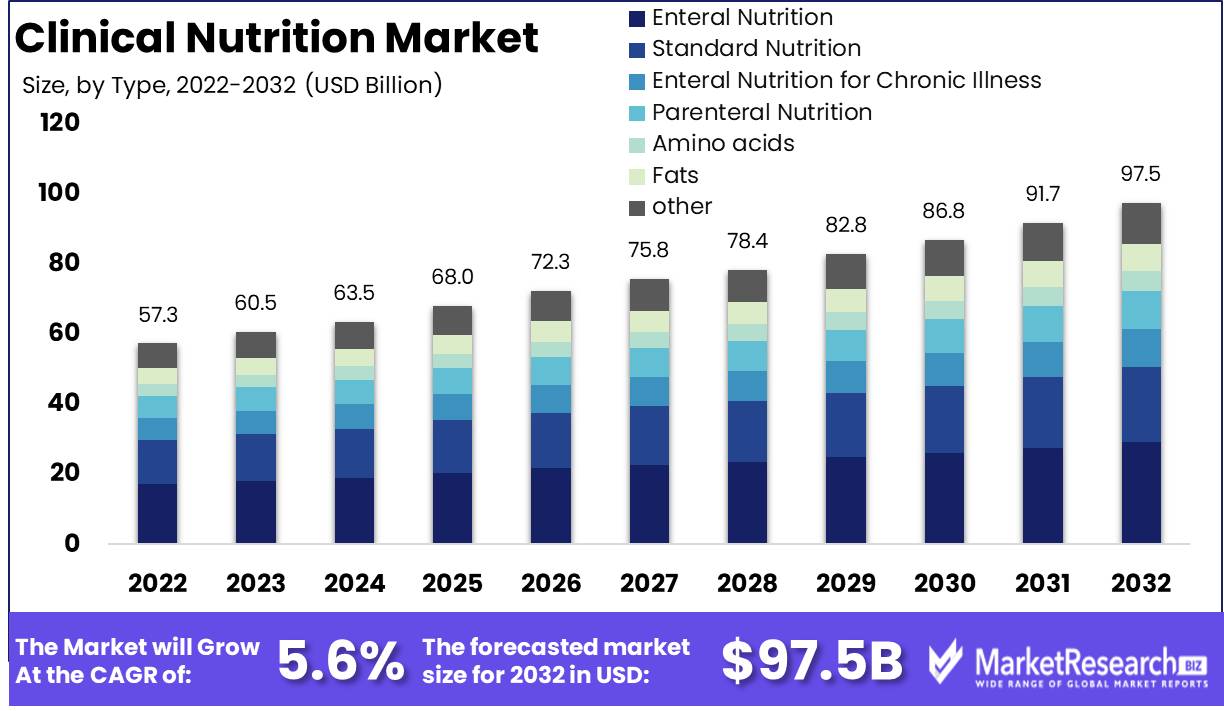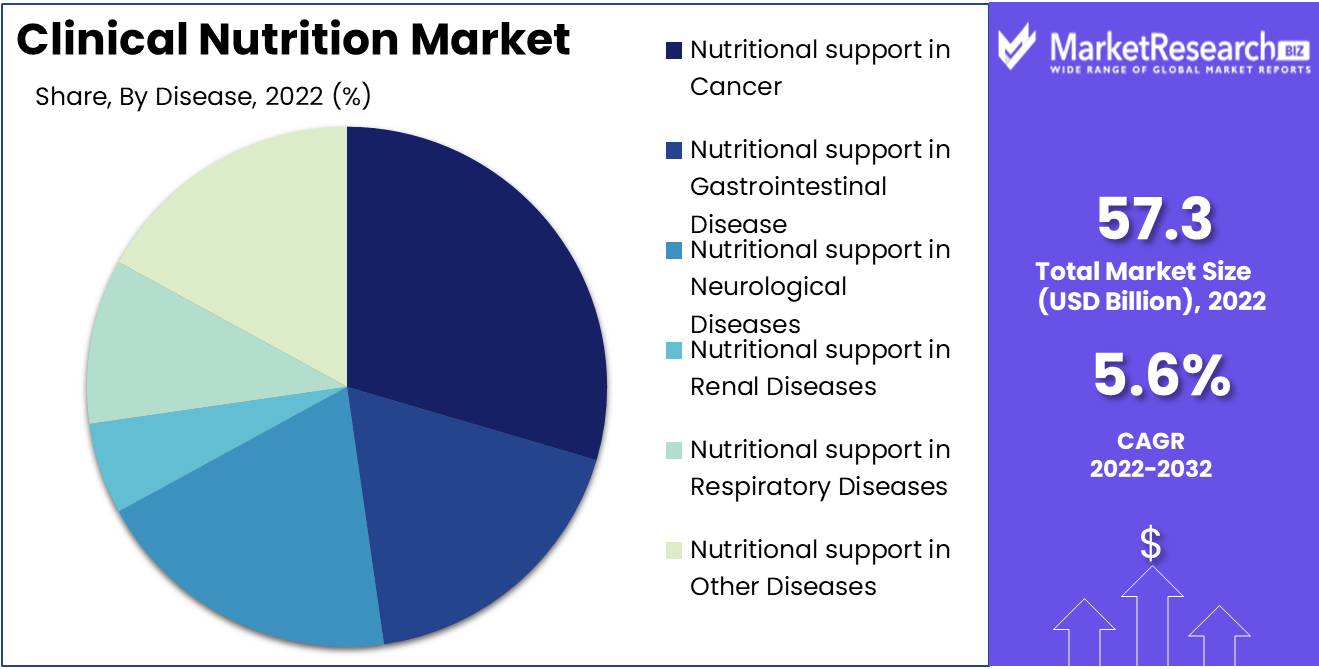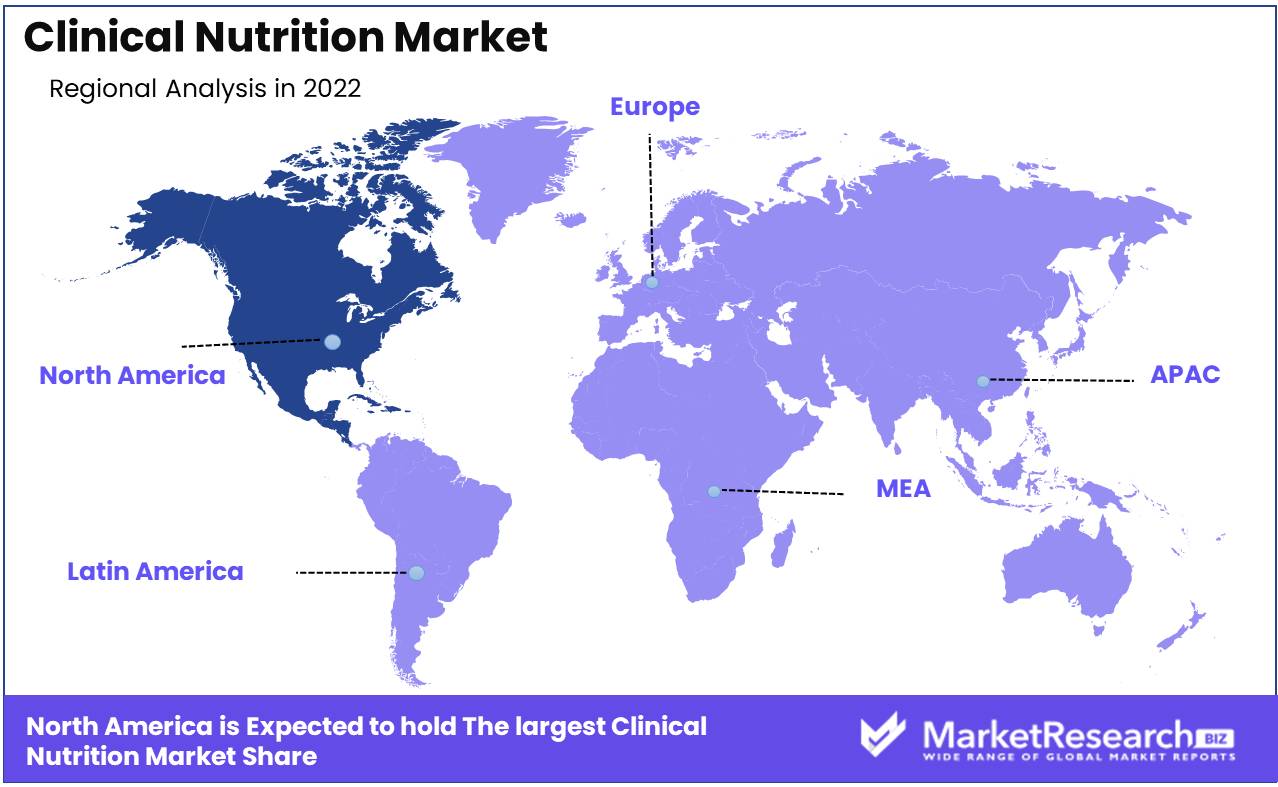
Clinical Nutrition Market By Type (Enteral Nutrition, Standard Nutrition, Others), By End-User (Infant and Child), By Disease (Nutritional support in Cancer, Nutritional support in Gastrointestinal Disease, and Others), By Region And Companies - Industry Segment Outlook, Market Assessment, Competition Scenario, Trends, And Forecast 2023-2032
-
24773
-
March 2023
-
165
-
-
This report was compiled by Correspondence Linkedin | Detailed Market research Methodology Our methodology involves a mix of primary research, including interviews with leading mental health experts, and secondary research from reputable medical journals and databases. View Detailed Methodology Page
-
Report Overview
Clinical Nutrition Market size is expected to be worth around USD 97.5 Bn by 2032 from USD 57.3 Bn in 2022, growing at a CAGR of 5.6% during the forecast period from 2023 to 2032.
The Clinical Nutrition market is a significantly expanding industry that focuses on providing optimal nutrition to patients with chronic diseases or disorders. This sector of the healthcare industry is committed to providing specialized care and attention to patients with specific medical conditions that necessitate special dietary requirements. This report examines the various facets of the Clinical Nutrition market, including its definition and objectives, the significance of its innovations.

The Clinical Nutrition market provides patients with essential nutrients to aid in their recovery from chronic conditions or diseases. The primary objective is to provide individualized nutritional support to help people achieve optimal health. The benefits of Clinical Nutrition include faster recovery, fewer complications due to comorbidities, and enhanced immunity. Notable innovations in this market include complex nutritional formulations, specialized regimens, and novel delivery mechanisms.
Beginning with the development of specialized regimens for individuals with specific medical conditions, the Clinical Nutrition market has a long history of innovation. This market currently includes sophisticated nutritional formulations that provide precise dosages of essential nutrients. Other noteworthy innovations include intravenous feeding and tube feeding, which provide nutrition to individuals who cannot consume through their mouths.
In the future years, the Clinical Nutrition market is anticipated to expand significantly due to an aging population and an increase in chronic diseases. This market encompasses numerous sectors, including hospitals, nursing homes, palliative care, and home health care. This industry's expansion has created numerous career opportunities for nutritionists, dietitians, and healthcare professionals with a passion for assisting others in improving their health.
On the Clinical Nutrition market, transparency, explicability, and accountability are emphasized. Providers are required to adhere to ethical standards and ensure that their products comply with regulatory requirements. In addition to contemplating the environmental impact of production and packaging, responsible Clinical Nutrition involves meeting the nutritional needs of patients. Providers must also consider the ethical implications of utilizing clinical nutrition to treat patients.
Driving factors
Combating Chronic Illnesses
As the world confronts the escalating prevalence of chronic diseases such as cancer, diabetes, and cardiovascular disorders, the Clinical Nutrition Market enters a new era. This unrelenting increase in chronic conditions paves the way for a demand for clinical nutrition products that has never been seen before. A symbiotic relationship develops, in which the rising prevalence of these conditions paves the way for the development of nutritional remedies that aim to alleviate their burdens.
Enabling the Senior Population
In a world where advancements in healthcare defy the limits of time, the geriatric population is at the forefront of clinical nutrition. As life expectancy rises, the need for individualized nutritional support for the elderly increases. As clinical nutrition advances to maintain the health and vitality of this growing population, ensuring that their golden years are spent in the embrace of wellness, a harmonious dance ensues.
The Innovation Revolution
With each technological and innovative advance, the field of clinical nutrition unveils a dazzling array of opportunities. From the depths of scientific creativity emerge innovative products that accommodate to the most complex dietary requirements. The world has a newfound understanding of the significance of clinical nutrition and its numerous advantages. The pursuit of personalized nutrition and the development of specialized clinical nutrition products are intertwined, paving the way for a future in which sustenance will be tailored to the specific needs of each individual.
Facilitating Medical Facilities
In hospitals and clinics, a revolution is occurring: the demand for enteral and parenteral nutrition products is on the rise. These essential lifelines provide sustenance to those in need, enabling medical professionals to combat diseases and restore vitality. The Clinical Nutrition Market rides this surge, demonstrating its central function in the ever-changing healthcare environment.
Embracing Veganism and Vegetarianism
As the global population adopts new dietary practices, the Clinical Nutrition Market charts a course to accommodate a variety of preferences. The rising tide of veganism and vegetarianism finds solace in the development of plant-based clinical nutrition products, whose ethical and nutritional allure captivates consumers. A kaleidoscope of opportunities unfolds, bridging the divide between mindful decisions and optimal health.
Expanding Health Care and the Pursuit of Health
The roots of healthcare expansion are sown within the prospering economies of developing nations. The demand for nutritional supplements and functional foods is propelled to new heights by the unrelenting pursuit of health, thereby propelling the Clinical Nutrition Market to new heights. In its pursuit of health, humanity embraces the transformative force of clinical nutrition.
The Promising Future of Clinical Nutrition
A constellation of positive motivating forces in the field of clinical nutrition propels the industry toward a bright future. As chronic diseases proliferate, geriatric requirements expand, and nutritional consciousness grows, the demand for clinical nutrition increases. This trajectory is strengthened by technological advancements, personalized solutions, and expanding healthcare. Despite the prevalence of challenges and changes, the Clinical Nutrition Market is poised for growth, propelled by an unwavering commitment to promoting health and bettering lives.
Restraining Factors
Clinical Nutrition Market Restraints
Cancer, malnutrition, and gastrointestinal illness patients have relied on clinical nutrition products. These items provide vitamins, minerals, and amino acids that the body needs. Due to chronic illness incidence and aging population need for nutritional supplements, the worldwide clinical nutrition market has grown significantly. However, various obstacles are limiting market expansion. This article discusses the biggest clinical nutrition market restraints.
Strict Regulations and Approvals
Clinical nutrition products are medicinal foods and must be approved by the FDA to market. Medical food clearance from the FDA is difficult and time-consuming. Clinical nutrition product makers must undertake extensive testing, clinical investigations, and safety criteria, which can slow and cost development. These barriers have hindered new market entries, slowing expansion.
High Clinical Nutrition Product and Manufacturing Costs
Complex equipment, technology, and controlled raw ingredients are needed to make clinical nutrition products. Time and expertise requirements increase production costs. Their production volume is smaller than other food items, making them more expensive to create. The high cost of clinical nutrition products limits market expansion.
Clinical Nutrition Product Side Effects
Clinical nutrition supplements might have negative effects. These side effects might vary in severity and affect the patient's health. Nausea, vomiting, diarrhea, and constipation are the most prevalent adverse effects of clinical nutrition products. These adverse effects might be difficult to manage and discourage patients from utilizing clinical nutrition products. Therefore, producers must verify their clinical nutrition solutions are safe and have no substantial negative effects.
Underdeveloped and Remote Regions
Access to clinical nutrition products varies significantly across industrialized and developing nations. Due to lack of healthcare infrastructure, knowledge, and expense, clinical nutrition products are scarce in poor and isolated areas. The lack of clinical nutrition products has slowed expansion in these locations and lowered market penetration.
Low Public Awareness and Knowledge
Clinical nutrition is still unfamiliar to most people. Clinical nutrition products have limited market demand due to little awareness of their potential advantages. Healthcare practitioners that promote, prescribe, and deliver clinical nutrition products are also uninformed. To educate patients about clinical nutrition, doctors must understand its advantages and kinds.
Type Analysis
The clinical nutrition market is witnessing tremendous growth across the globe. Among the various segments of clinical nutrition, the Enteral nutrition segment is the dominant one. This segment offers nutrition solutions through the gastrointestinal tract, which includes feeding through a tube, stomach, or jejunum. The growth of the enteral nutrition segment is driven by several factors, including the aging population, increasing prevalence of chronic diseases, and a rising number of patients that require long-term support.
There is a growing trend among consumers to seek natural, organic, and clean label products, including those in the clinical nutrition market. Patients and their families have become more conscious of the products they consume, and the enteral nutrition segment has responded by offering organic and natural products that cater to these preferences. Due to the factors mentioned above, the enteral nutrition segment is expected to record the fastest growth rate in the clinical nutrition market over the forthcoming years.
Disease Analysis
The Nutritional support in cancer segment dominates the clinical nutrition market. Nutritional support in Cancer patients often experience poor appetite, weight loss, and other nutritional deficiencies due to the side effects of chemotherapy and surgery. Clinical nutrition products are essential to support the nutritional status of cancer patients, thereby improving their outcomes and quality of life.
Consumers are increasingly seeking products that are catered towards specific medical conditions, including Nutritional support in cancer. The cancer segment is expected to witness growth as patients demand products that are designed specifically to cater to their unique nutritional needs. Due to the increasing incidence of cancer in various regions of the world, the cancer segment is anticipated to register the fastest growth rate in the clinical nutrition market in the forthcoming years.

Key Market Segments
By Type
- Enteral Nutrition
- Standard Nutrition
- Enteral Nutrition for Chronic Illness
- Parenteral Nutrition
- Amino acids
- Fats
- Carbohydrates
- Others
By End-User
- Infant
- Child
- Adult
- Geriatric
By Disease
- Nutritional support in Cancer
- Nutritional support in Gastrointestinal Disease
- Nutritional support in Neurological Diseases
- Nutritional support in Renal Diseases
- Nutritional support in Respiratory Diseases
- Nutritional support in Other Diseases
Growth Opportunity
A Shift in the Healthcare Model
Clinical Nutrition is vast, yet Personalized Nutrition shines. Customized food attracts seniors to this inviting domain. As time passes, nutrition needs change, requiring customized solutions. Personalized Nutrition allows healthcare doctors to create nutritional compositions for each patient. Clinical nutrition patients face chronic illnesses, medical problems, and surgical procedures, making specialist clinical nutrition products a potent catalyst.
Home Nutritional Counseling
Home Parenteral and Enteral Nutrition Therapy is at the forefront of the expansion of the Clinical Nutrition market, guided by the rhapsodies of patient autonomy and convenience. Chronic conditions and diseases requiring specialized diets are deftly managed by this novel form of therapy, which bestows the benefits of personalized nutrition in the convenience of patients' own residences.
A Tapestry of Development Woven
A transformational symphony reverberates throughout emerging economies, fostering the expansion of the Clinical Nutrition market. As the infrastructure of healthcare advances, a captivating tale of enhanced accessibility and superior patient outcomes transpires. Within the fertile soil of these burgeoning economies, the seedlings of demand for nutritional supplements and functional foods germinate and flourish, their multifaceted allure capturing the hearts and minds of a populace awakening.
The Chronic Disease Catch-22
The global community is unified against a formidable foe: chronic maladies and disorders. Armed with ill lifestyles, rising levels of stress, and the ever-present specter of environmental factors, these diseases pose a terrifying threat. Chronic diseases are more likely to occur and are more severe when nutritional deficiencies are present. In this crucible of turmoil, the clarion cry for nutritional supplements and functional foods resounds, offering a ray of hope.
The Wellness Revival
A seismic shift occurs within the collective consciousness of a health-conscious population, unraveling the vibrant tapestry of the Clinical Nutrition market. Demand for nutritional supplements and functional foods is insatiable as a result of the population's desire for holistic well-being and growing recognition of the importance of nutrition. In the souls of millions reverberates a chorus of desires harmonizing the melodies of sustenance and vitality.
Latest Trends
Plant-Based Clinical Nutritional Products
The increasing prevalence of plant-based diets is one of the most striking trends in the nutrition industry at present. Plant-based nutrition products have acquired tremendous popularity due to the increasing demand for environmentally friendly, plant-based alternatives to animal-based foods. Diets based on plants have been linked to a variety of health benefits, including a reduced risk of chronic diseases such as heart disease, diabetes, and cancer. The clinical nutrition market has witnessed an influx of plant-based products.
Technological Developments and Innovations
Through significant technological advances, the clinical nutrition industry has developed innovations that appeal to an ever-expanding range of consumer requirements. For instance, we are currently witnessing an increase in personalized nutrition products that are tailored to satisfy the specific nutritional requirements of individual consumers. As consumers' health consciousness increases, they select for nutrition products that target specific health conditions.
Infant and Young Child Nutritional Products
The global baby food market is expanding rapidly due to the rising demand for nutritional products for neonates and young children. In recent years, the market has witnessed an increase in demand for infant food products that do not contain artificial sweeteners, colors, or preservatives. Parents are currently seeking infant food products that are not only healthy, but also organic, sustainable, and secure.
Enteral and Parenteral Nutrition Products
The market for enteral and parenteral nutrition products continues to expand as healthcare institutions seek novel approaches to combat malnutrition among patients. Due to the rising prevalence of chronic diseases such as cancer, AIDS, and gastrointestinal disorders, the enteral nutritional market, which includes tube feeding, has experienced a constant increase in demand. The market for parenteral nutrition, which includes intravenous feeding, is also expanding due to the development of technologies such as bag-based feeding systems and nutrition software.
Greater emphasis on research and development
The clinical nutrition industry continues to invest heavily in research and development in order to foster innovation in the field. To remain ahead of the curve, companies invest significantly in research and development to create new products that cater to a variety of markets and nutritional requirements. This strategy has resulted in the development of personalized nutrition products that are revolutionizing how individuals approach their nutritional needs.
Regional Analysis
Due to the high prevalence of chronic diseases and the rising demand for specialized clinical nutrition products, the United States dominates the North American market. Globally, health and wellbeing have always been of paramount importance. As the prevalence of chronic diseases rises, so too does the need for specialized clinical nutrition products.
As the continent with the greatest number of chronic disease patients, North America is the epicenter of clinical nutrition products. Due to its high prevalence of chronic diseases and rising demand for specialized clinical nutrition products, the United States dominates this market. This article will investigate the reasons why the United States dominates the North American clinical nutrition market.
To the increase in the prevalence of chronic diseases, the demand for specialized clinical nutrition products has increased. These products are indispensable for the management of chronic diseases, and their demand is not limited to the United States alone. Other North American nations, including Canada, are also experiencing a rise in demand for specialized clinical nutrition products. However, for various factors, the United States dominates the market.

Key Regions and Countries
North America
- US
- Canada
- Mexico
Western Europe
- Germany
- France
- The UK
- Spain
- Italy
- Portugal
- Ireland
- Austria
- Switzerland
- Benelux
- Nordic
- Rest of Western Europe
Eastern Europe
- Russia
- Poland
- The Czech Republic
- Greece
- Rest of Eastern Europe
APAC
- China
- Japan
- South Korea
- India
- Australia & New Zealand
- Indonesia
- Malaysia
- Philippines
- Singapore
- Thailand
- Vietnam
- Rest of APAC
Latin America
- Brazil
- Colombia
- Chile
- Argentina
- Costa Rica
- Rest of Latin America
Middle East & Africa
- Algeria
- Egypt
- Israel
- Kuwait
- Nigeria
- Saudi Arabia
- South Africa
- Turkey
- United Arab Emirates
- Rest of MEA
Key Players Analysis
The Clinical Nutrition market is a significantly expanding sector that serves the medical and healthcare industries. As the demand for superior nutritional products and supplements continues to rise, market leaders are prioritizing the expansion of their product lines, the exploration of new markets, and the funding of research and development.
Abbott Laboratories, Nestl Health Science, Baxter International Inc., Perrigo Company plc, B. Braun Melsungen AG, Danone Nutricia, Mead Johnson & Company, LLC, Fresenius Kabi AG, GlaxoSmithKline plc, and Hospira Inc. are the key players in the Clinical Nutrition market. With their extensive product lines and global distribution networks, these companies dominate the market. In addition, these companies make substantial investments in mergers and acquisitions, partnerships, and collaborations to strengthen their market position.
With a market share of over 20%, Abbott Laboratories is the dominant player in the Clinical Nutrition market. Parenteral and enteral nutrition, infant nutrition, and sports nutrition are among the many nutritional products offered by the company. Nestl Health Science is an additional significant market player with a diverse product portfolio that includes clinical nutrition, consumer health, and medical food products.
Top Key Players in Clinical Nutrition Market
- Abbott Laboratories Inc.
- Nestle Nutrition
- GlaxoSmithKline
- Danone
- Mead Johnson
- Baxter Healthcare Ltd.
- Fresenius Kabi AB
- Nutricia
- B Braun Melsungen AG.
Recent Development
In 2021, Abbott Laboratories introduced its diabetes-specific metabolic formula Glucerna Select. It manages blood sugar, weight, and heart health. The diabetic community applauded the product's introduction since it advances diabetes control.
In 2021, Nestle Health Science bought customized nutrition firm Persona, which creates tailored vitamin regimens for consumers. Persona's technology will be integrated into Nestle Health Science's health and wellness products, boosting its tailored nutrition offerings.
In 2020, Danone released Vega plant-based protein powders for customers seeking sustainable nutrition. Danone's dedication to healthier and more sustainable lives reflects the increased demand for plant-based goods.
In 2019, B. Braun Medical purchased Spanish business Medifema to extend its clinical nutrition line with specialist products. B. Braun gained market share and expanded patient care with the acquisition.
In 2019, Fresenius Kabi launched a clinical nutrition unit in China to get into the fast-growing Asian market. The business uses cutting-edge technologies to address regional demand for specialty nutrition products.
Report Scope:
Report Features Description Market Value (2022) USD 57.3 Bn Forecast Revenue (2032) USD 97.5 Bn CAGR (2023-2032) 5.6% Base Year for Estimation 2022 Historic Period 2016-2022 Forecast Period 2023-2032 Report Coverage Revenue Forecast, Market Dynamics, COVID-19 Impact, Competitive Landscape, Recent Developments Segments Covered By Type (Enteral Nutrition, Standard Nutrition, Enteral Nutrition for Chronic Illness, Parenteral Nutrition, Amino acids, Fats, Carbohydrates, Others)
By End-User (Infant, Child, Adult, Geriatric)
By Disease (Nutritional support in Cancer, Nutritional support in Gastrointestinal Disease, Nutritional support in Neurological Diseases, Nutritional support in Renal Diseases, Nutritional support in Respiratory Diseases, Nutritional support in Other Diseases)
By Type (Enteral Nutrition, Standard Nutrition, Enteral Nutrition for Chronic Illness, Parenteral Nutrition, Amino acids, Fats, Carbohydrates, Others)Regional Analysis North America – The US, Canada, & Mexico; Western Europe – Germany, France, The UK, Spain, Italy, Portugal, Ireland, Austria, Switzerland, Benelux, Nordic, & Rest of Western Europe; Eastern Europe – Russia, Poland, The Czech Republic, Greece, & Rest of Eastern Europe; APAC – China, Japan, South Korea, India, Australia & New Zealand, Indonesia, Malaysia, Philippines, Singapore, Thailand, Vietnam, & Rest of APAC; Latin America – Brazil, Colombia, Chile, Argentina, Costa Rica, & Rest of Latin America; Middle East & Africa – Algeria, Egypt, Israel, Kuwait, Nigeria, Saudi Arabia, South Africa, Turkey, United Arab Emirates, & Rest of MEA Competitive Landscape Abbott Laboratories Inc., Nestle Nutrition, GlaxoSmithKline, Danone, Mead Johnson, Baxter Healthcare Ltd., Fresenius Kabi AB, Nutricia, B Braun Melsungen AG. Customization Scope Customization for segments, region/country-level will be provided. Moreover, additional customization can be done based on the requirements. Purchase Options We have three licenses to opt for: Single User License, Multi-User License (Up to 5 Users), Corporate Use License (Unlimited User and Printable PDF) -
-
- Abbott Laboratories Inc.
- Nestle Nutrition
- GlaxoSmithKline
- Danone
- Mead Johnson
- Baxter Healthcare Ltd.
- Fresenius Kabi AB
- Nutricia
- B Braun Melsungen AG.




